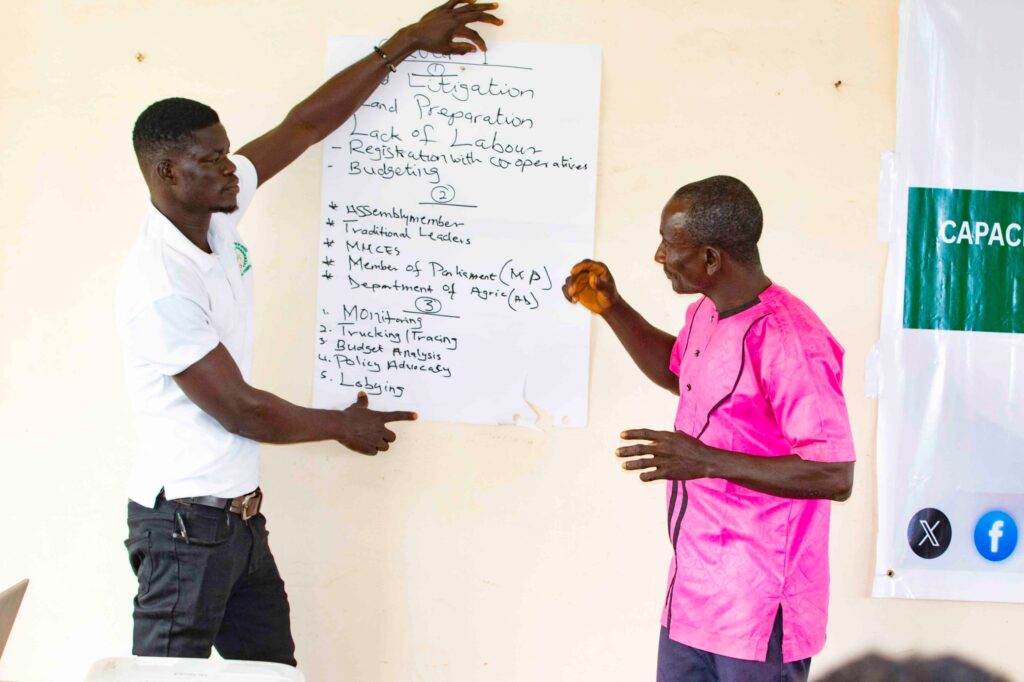The Peasant Farmers Association of Ghana (PFAG), as part of its efforts to strengthen the technical capacities of its membership organized a two-day capacity-building workshop. The training focused on competences, including group governance, cooperative registration, budgeting processes, and participatory decision-making at the local level. The objective of the program was to empower smallholder farmer leaders in the districts to understand the importance of having formidable groups, registering as cooperatives and active participating in governance at the local level.
These activities took place in the Nkoranza South and Krachi East districts of the Bono East and Oti regions of Ghana respectively. The two (2) days’ workshops in each district forms part of activities under the project titled ‘“Strengthening Farmers’ Voices to Promote Accountability and Inclusive Decision-Making in Ghana” with support from Star Ghana Foundation.

In the Nkoranza South district, the program witnessed participation of farmer leaders from the Fiema, Boabeng, Ahyiayemu, Nankuma, Nkwabeng, Ayerede communities including representatives from the Municipal Department of Agriculture, district assembly and department of cooperatives.
Mr. Bismark Owusu Nortey, Acting Executive Director of PFAG, stressed the need to strengthen farmer leaders capacity to enable them be involved in decision-making process at the local level. It was crucial for them to understand the district assembly governance structure, budget preparation process and existing platforms that they can engage authorities.
Madam Regina Daberin, the PFAG’s regional focal person for Ashanti, Bono and Ahafo regions, applauded the participants for their commitment and stressed that their presence should serve as a point of contact to their entire grassroots membership so that the knowledge gained at the workshop will trickle down through step-down training and meetings.
Mrs. Gifty Fremah Appiah, the Municipal Director, Department of Agriculture in Nkoranza South during her opening remarks highlighted her office close working relationship with smallholder farmers in the district. She also shared a brief information on the Feed Ghana programme and how the PFAG members can benefit from it when its fully rolled out. The Municipal Coordinating Director, Nkoranza South, Mr. Fredrick Akitty, commended PFAG for the workshop and highlighted their effort in advocating for better living conditions for smallholder farmers across the country. He stressed that the assembly is ever ready to collaborate with farmers leaders within the district on their pressing needs.
Mrs. Ruth Kwertey from the Department of Cooperatives, Kintampo Municipal took participants through intensive presentation focusing on group dynamics, group management, and cooperative formation. The Municipal planning officer, Mr. James Boakye on his part shared insight on district level budget processes, budget cycle and preparation and how smallholder farmers at the local level can participate in the municipal assembly budgetary processes.
In Krachi East, the capacity building workshop was attended by farmer leaders of the various groups from communities such as Tokuroano, Kpassa, Akpafu, Dambai and Kparekpare, including representatives from the regional Departments of Agriculture, district planning office and department of cooperatives.
Madam Mercy Acquah, the Municipal Cooperative Director for Krachi East during her facilitation stressed on the core tenets of cooperative formation and group dynamics. She highlighted the roles of the department which includes sensitizing and facilitating the creation of societies, official registration, auditing their financial records, monitoring their operations, arbitrating internal disputes, and even overseeing their dissolution.
Mr. Ernest Adarkwa Yiadom, the Planning Officer of the Krachi East Municipal Assembly, delivered a detailed presentation on the intricacies of budget processes and local-level decision-making. He emphasized that although assemblies proposed annual budgets, they cannot be implemented without a formal Appropriation Act from Parliament, which grants public institutions the legal authority to spend. He added that a crucial distinction from private organizations, and without this parliamentary approval, even statutory allocations like the District Assemblies Common Fund (DACF) are inaccessible.
Mr. Obrien Nyarko, Regional Director-Department of Agriculture, in his closing remarks advised farmer leaders to work closely with the department to help them gain more knowledge and information for their farming activities. He added that farmers should always feel free to invite his office for their group meetings.
The 2-day capacity building focused on budget tracking, analysis and advocacy skills for both districts. Participants were given a group work; they responded and developed their action plans including key stakeholders to engage to register their concerns where necessary.

